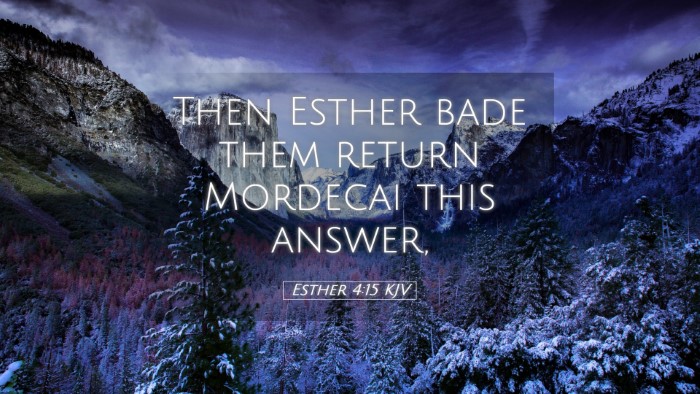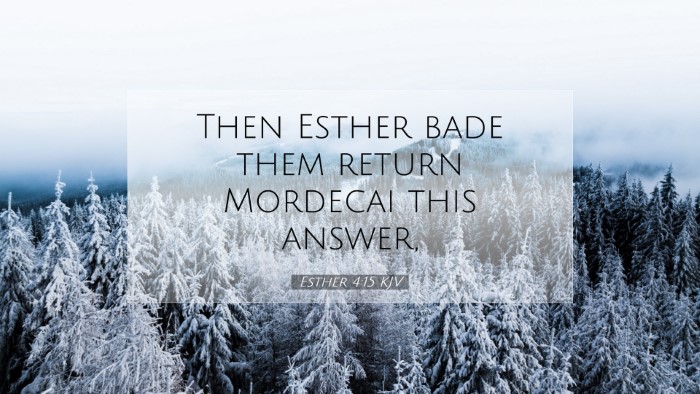Old Testament
Genesis Exodus Leviticus Numbers Deuteronomy Joshua Judges Ruth 1 Samuel 2 Samuel 1 Kings 2 Kings 1 Chronicles 2 Chronicles Ezra Nehemiah Esther Job Psalms Proverbs Ecclesiastes Song of Solomon Isaiah Jeremiah Lamentations Ezekiel Daniel Hosea Joel Amos Obadiah Jonah Micah Nahum Habakkuk Zephaniah Haggai Zechariah MalachiEsther 4:15
Esther 4:15 KJV
Then Esther bade them return Mordecai this answer,
Esther 4:15 Bible Commentary
Esther 4:15 Commentary
Bible Verse: “Then Esther told them to reply to Mordecai, ‘Go, gather all the Jews who are present in Shushan, and fast for me; neither eat nor drink for three days, night or day. My maids and I will fast likewise. And so I will go to the king, which is against the law; and if I perish, I perish!’”
Introduction
This verse is pivotal within the Book of Esther. It highlights Esther's courage, the significance of communal fasting, and the tension between divine providence and human agency. In this commentary, we will draw from the insights of respected public domain commentators including Matthew Henry, Albert Barnes, and Adam Clarke to explore the depth of Esther 4:15.
Contextual Background
The Book of Esther recounts the story of a Jewish woman, Esther, who becomes queen of Persia. In the fourth chapter, a crisis emerges when Haman plots to annihilate the Jewish people, prompting Mordecai to urge Esther to intercede with the king. This sets the stage for Esther’s decision to risk her life for her people.
Esther's Response: A Study of Leadership and Courage
Esther’s directive to Mordecai highlights her proactive leadership. She understands the gravity of her situation and the potential consequences of her actions. The call to gather the Jews of Shushan for fasting underscores her dependence on God’s providence.
- Mordecai's Influence: According to Albert Barnes, Mordecai's charge to Esther is not merely to act but to receive divine wisdom through prayer and fasting. Esther's invitation for others to fast reflects a collective appeal to God.
- The Nature of Fasting: Matthew Henry emphasizes that fasting in this context is an expression of deep reliance on God. It serves as a tool for spiritual clarity and preparation, showing the seriousness of the impending confrontation with the king.
Theological Insights
The exchange between Esther and Mordecai reveals profound theological principles regarding God’s providence. Esther acknowledges that her actions may lead to her death, yet she is willing to sacrifice for a greater good. Adam Clarke elaborates on this paradox, noting that true faith often requires stepping into uncertainty without guarantees of safety.
- The Role of Divine Providence: The timing and placement of Esther in the Persian court illustrate the theme of God’s providential care. Clarke remarks that God’s unseen hand is evident throughout the narrative, orchestrating events for His purposes.
- Human Responsibility: While divine providence is crucial, human agency plays an equally significant role. Esther’s decision to risk her life illustrates the necessity of personal involvement in delivering justice and upholding righteousness.
Application for Today
The themes present in Esther 4:15 resonate deeply with contemporary readers, particularly leaders in faith communities. The call to fast, to seek God’s will, and to act courageously in difficult circumstances is as relevant today as it was in Esther’s time.
- Fasting as a Spiritual Discipline: Pastors and church leaders can encourage congregations to engage in communal fasting as a means of seeking God’s guidance in challenging times. This biblical principle fosters unity and dependence on God.
- Courage in Leadership: Esther’s willingness to risk her life serves as a model for Christian leaders today who may face opposition or difficult decisions. It can inspire believers to stand firm in their faith even in the face of adversity.
- Trusting in God's Plan: The story of Esther encourages believers to trust in God’s providential plans. Like Esther, they must sometimes act with courage, knowing that God is working through their actions to fulfill His purpose.
Conclusion
Esther 4:15 is a profound verse that encapsulates essential themes of faith, courage, and divine providence. By gathering her people to fast, Esther demonstrates leadership rooted in spiritual dependence. This verse challenges modern readers to reflect on their roles in God’s unfolding story and to act faithfully in their spheres of influence.


